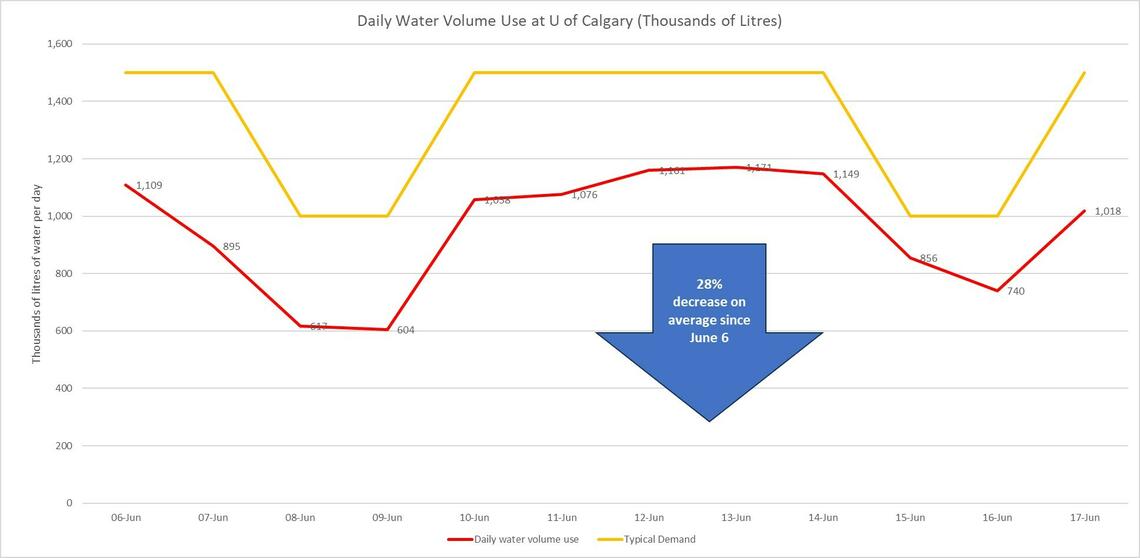June 18, 2024
Update: Critical water supply shortage to continue five weeks

The University of Calgary continues to work with the City of Calgary to support reducing water demand as more extensive repairs are needed to municipal infrastructure. It is vital that our entire campus community take active steps to continually reduce water use.
Status on repairs
On Thursday, June 6, 2024, the City of Calgary reported a water main break along 16th Avenue N.W. that has impacted the city’s water supply. Supply levels have reached a critical state, affecting the city’s ability to provide water to communities and ensure adequate water supply is available to support emergency fire suppression .
Investigation of the pipeline has identified multiple spots where the pipe is at high risk of further breaks. As a result, the City of Calgary is expecting repairs will take another three to five weeks to complete.
A minimum daily reduction of 25% of water usage is required city-wide to protect the municipal water supply.
Water use on campus
The University of Calgary has long made reducing its dependence on city water supply a priority. UCalgary draws untreated water directly from the river to water lawns and plants or to help cool some buildings.
Since the critical water shortage began, UCalgary has actively worked to reduce the amount of water it draws from city infrastructure.
- Those living in residence are asked to continue limiting water use when showering, laundry and doing dishes.
- Showers in Kinesiology remain unavailable.
- No new water has been added to the pool.
- Caretaking teams have adjusted their cleaning schedules to minimize water usage.
- Research teams investigated ways to reduce water for their experiments.
As a result of campus-wide efforts, UCalgary has been able to reduce water use by an average of 28% since June 6.

No changes to work from home
At this time, the university’s existing Hybrid Work Program remains unchanged. Employees are expected to work their usual in-person days. Classes will also continue as scheduled.
Research
Water plays a key role in research operations. Researchers use water for experiments, to maintain or clean equipment, or to grow plants for research purposes.
Researchers who are considering launching new experiments that are water intensive are asked to postpone for the near future. This will reduce demand for water use, and also protect research integrity should the city’s water supply be further compromised.
Please contact the Office of the Vice President Research for advice.
Foothills campus
The Foothills campus is dependent on the Foothills Medical Centre for its water supply. As the critical water shortage continues, Alberta Health Services may take additional measures to protect its water supply. As details become available, we will communicate to the Cumming School of Medicine and the faculty of Veterinary Medicine about any possible impacts on Foothills campus.
Reducing water use together
UCalgary community is asked to consider how to reduce water use on campus and at home. The campus community is asked to report any facility-related water issues in Archibus or call customer care at 403.220.7555.
The City of Calgary is also asking all of us to take active steps to reduce personal water use.
Don’t
- Water lawns, gardens, flowers or trees with City water.
- Fill outdoor pools or hot tubs.
- Wash windows, exterior building surfaces, sidewalks or driveways.
- Fill fountains or decorative water features.
- Wash your car.
- Use water for construction purposes.
Do
- Turn off outdoor automatic sprinklers.
- Use the dishwasher and washing machine only with full loads.
- Limit showers to three minutes or less, turn off water when lathering.
- Keep baths shallow.
- Turn off humidifiers and ice machines.
- Wash vegetables and fruit in a partially filled sink or pot and rinse them quickly.
- Keep a jug of drinking water in your fridge. Don’t run the tap to get ice cold water.
- Turn off the tap when brushing your teeth or shaving.
